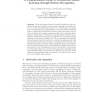1406 search results - page 17 / 282 » Learning Pseudo-independent Models: Analytical and Experimen... |
ICPR
2010
IEEE
14 years 23 days ago
2010
IEEE
A method for Gaussian process learning of a scalar function from a set of pair-wise order relationships is presented. Expectation propagation is used to obtain an approximation to...
ITS
2010
Springer
14 years 1 months ago
2010
Springer
Accelerated future learning, in which learning proceeds more effectively and more rapidly because of prior learning, is considered to be one of the most interesting measures of ro...
JMLR
2008
13 years 8 months ago
2008
We study a generative model in which hidden causes combine competitively to produce observations. Multiple active causes combine to determine the value of an observed variable thr...
NIPS
2007
13 years 9 months ago
2007
Reward-modulated spike-timing-dependent plasticity (STDP) has recently emerged as a candidate for a learning rule that could explain how local learning rules at single synapses su...
KDD
2012
ACM
11 years 10 months ago
2012
ACM
Crowdsourcing has recently become popular among machine learning researchers and social scientists as an effective way to collect large-scale experimental data from distributed w...


